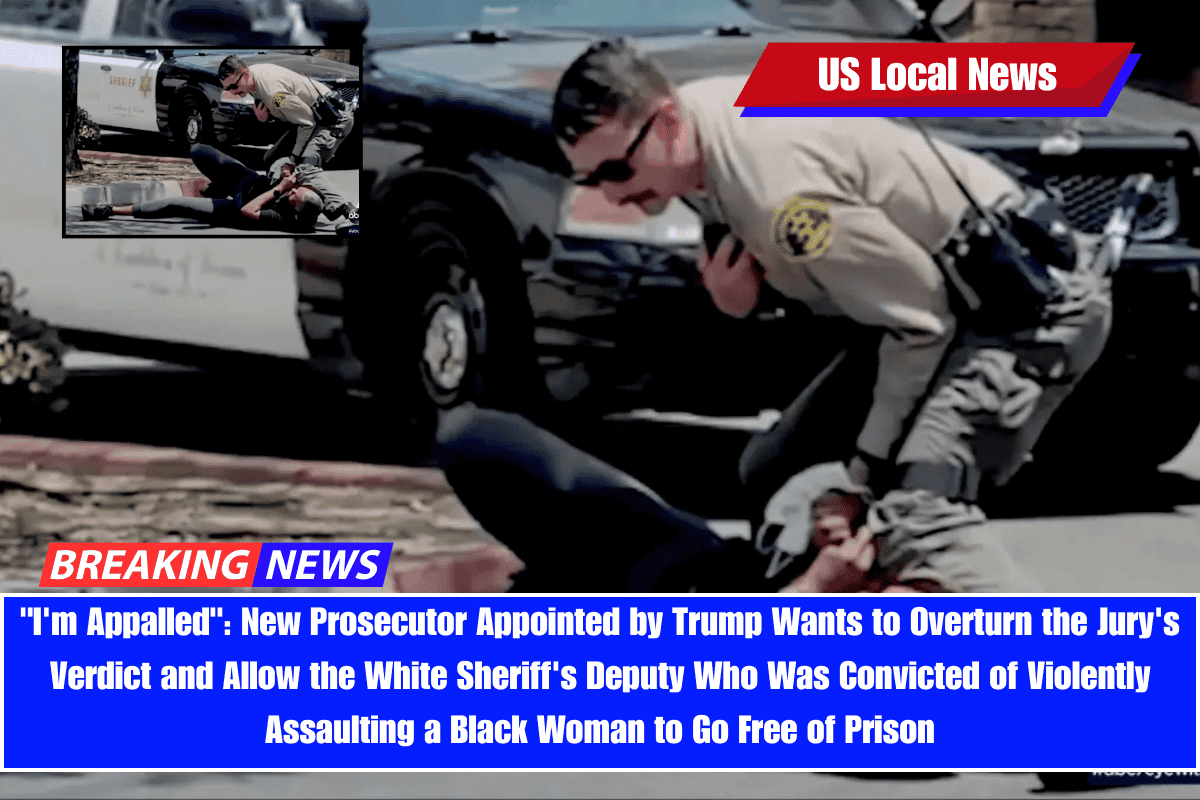A plea deal offered to former Los Angeles sheriff’s deputy Trevor Kirk has raised eyebrows and sparked controversy in the legal community, leading to resignations among assistant U.S. attorneys and raising questions about the integrity of the justice system.
The deal, which would allow Kirk to plead guilty to a misdemeanor instead of the felony he was convicted of, has drawn criticism from both legal professionals and the public.
The Case Against Trevor Kirk
Kirk was convicted in February 2025 after a jury found him guilty of felony deprivation of rights under color of law for his brutal assault on Jacy Houseton, a Black woman, during a robbery investigation in Lancaster, California.
On June 2023, Kirk and his colleague, Deputy Felipe Alejandre Jr., responded to a reported robbery at a local grocery store. While Alejandre detained a man, Kirk approached Houseton, who had been filming the arrest.
In a violent encounter, Kirk threw Houseton to the ground, placed his knee on her neck, threatened to punch her, and pepper-sprayed her twice, causing multiple injuries, including a blunt head injury and chemical conjunctivitis.
The jury found that Kirk had used excessive force and convicted him of felony deprivation of rights under color of law, which carries a potential prison sentence of up to 10 years. However, recent developments have cast doubt on the verdict.
A Controversial Plea Agreement
Following Kirk’s conviction, a plea deal was introduced by Bill Essayli, the new Trump-appointed U.S. Attorney for the Central District of California.
The deal would allow Kirk to plead guilty to a misdemeanor rather than the felony conviction, with the U.S. Attorney’s Office moving to strike the jury’s finding that Kirk injured Houseton, which made the crime a felony.
If accepted, Kirk could serve a maximum of one year in prison and potentially avoid a permanent ban on working as a law enforcement officer.
The deal has been widely criticized for undermining the justice system and diminishing the power of the jury’s unanimous verdict. Caree Harper, Houseton’s attorney, called the plea deal “a slap in the face of justice,” adding that it was “appalling” to think that the Justice Department could overturn a lawful jury decision.
Resignations and Legal Concerns
The plea agreement has prompted significant backlash, especially among those who were involved in prosecuting the case.
Three assistant U.S. attorneys—Eli Alcaraz, Michael Morse, and Brian Faerstein—resigned from the case in protest, with Alcaraz, Faerstein, and Cassie Palmer, the chief of the Public Corruption and Civil Rights Section, resigning from their positions entirely. The resignations further underscore the intensity of the disagreement over the plea deal.
Judge Stephen W. Wilson, who presided over the trial, has raised concerns about the legality of the motion to strike the felony verdict. In a court order, Wilson questioned whether he had the authority to grant such a motion and demanded further explanation from the prosecutors by May 13.
Union Support and Political Ties
The Los Angeles Sheriffs’ Professional Association, which has supported Kirk throughout the case, has expressed encouragement over the developments. The union’s spokesperson, Nick Wilson, stated that they were “deeply grateful” for the Department of Justice’s reconsideration of the facts in the case.
However, many critics argue that the plea deal reflects political interference, especially given Essayli’s strong ties to Trump and his history of endorsing conservative candidates, including Wilson.
A Diminishing Verdict and Future Legal Precedents
Retired U.S. District Judge Andrew J. Guilford criticized the plea deal, arguing that it undermines the power and integrity of the grand jury’s indictment and the jury’s verdict.
“The sacredness of a unanimous jury verdict is diminished,” Guilford said, warning that the decision to offer such a plea deal could set a dangerous precedent in future cases involving police violence.
As the legal battle continues, with Judge Wilson scheduled to rule on the proposed plea agreement on May 19, the case remains a flashpoint in the debate over police accountability and the treatment of law enforcement officers who commit excessive violence.











Leave a Reply